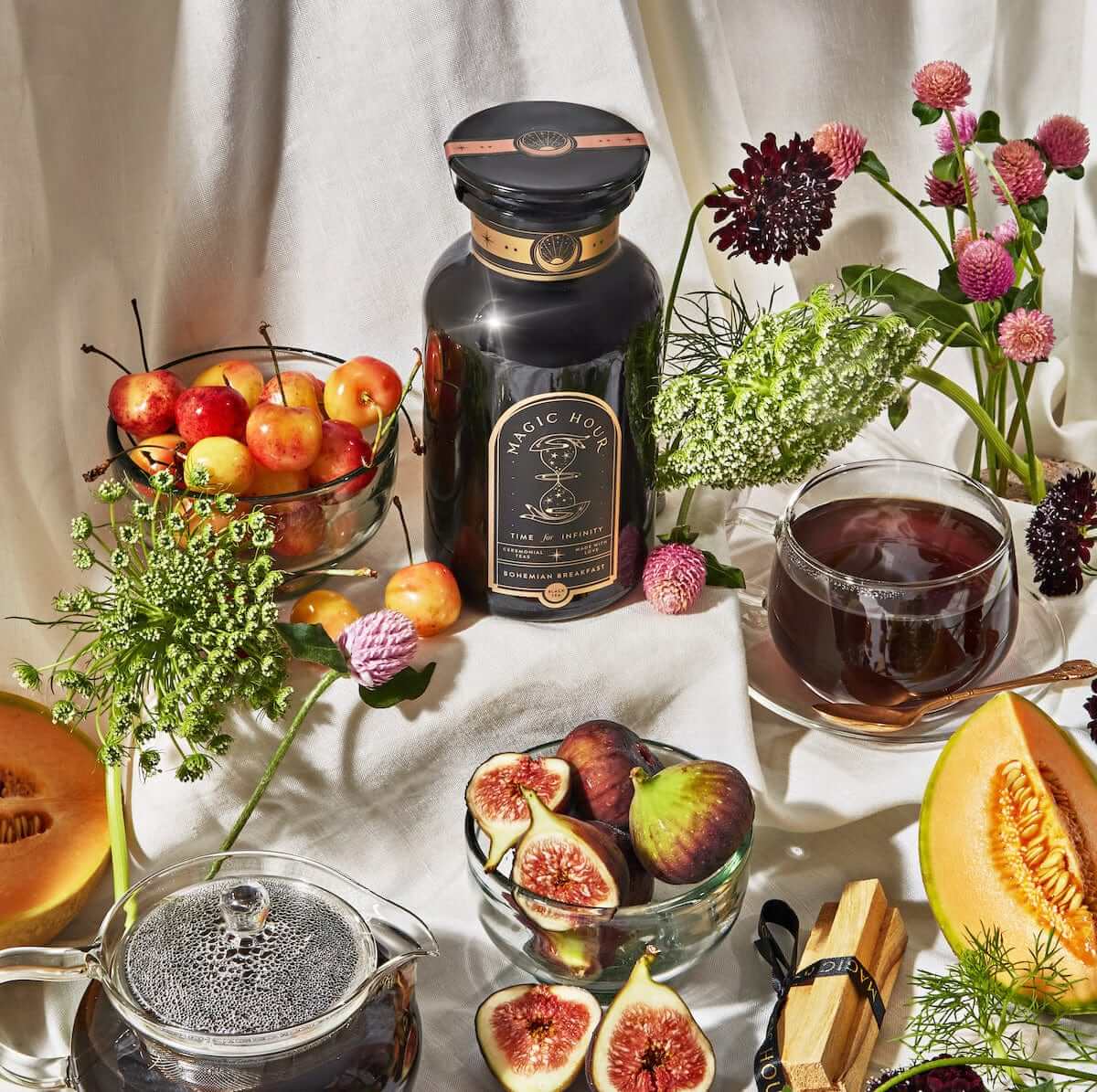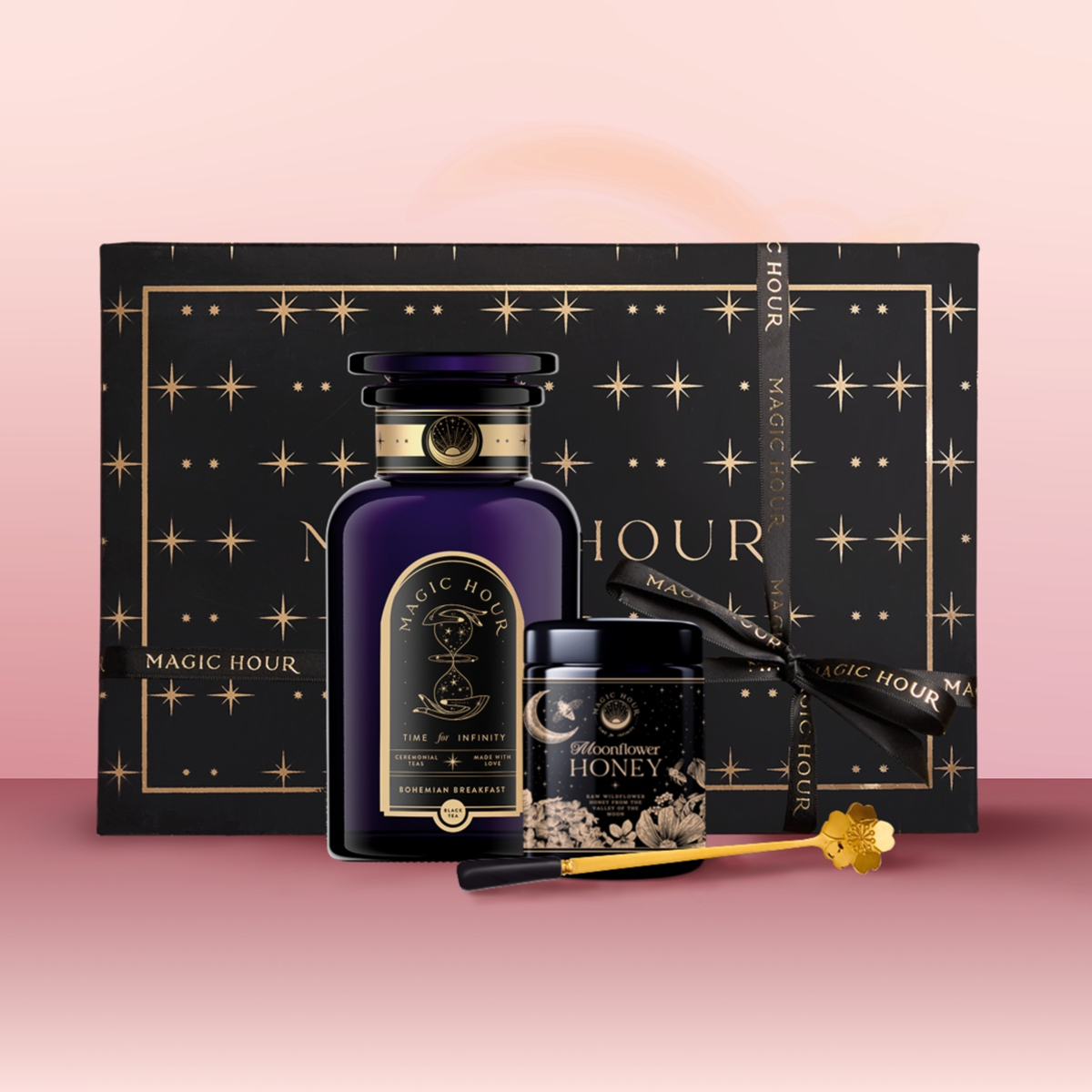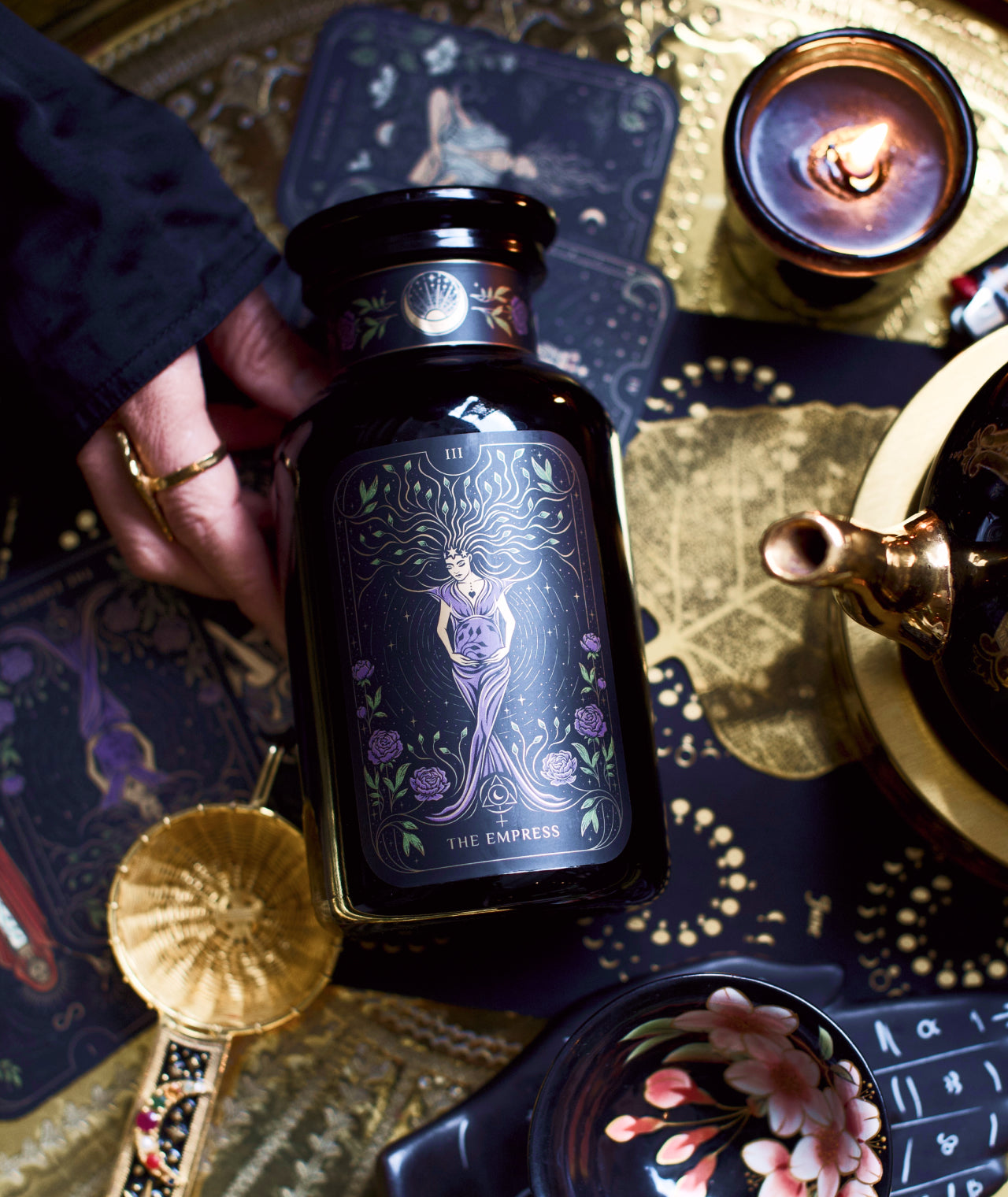I loved creating this tea blend for you! The Empress is one of my favorite tarot cards and as it symbolizes the abundance and potential of all of life through the power of the feminine in us all, I wanted to create an abundant, rich, deeply nurturing and complex blend that would tie roots to trunk to leaves in our bodies and as symbolized by The Tree of Life.
Each sip of this blend will bring you nurturing, creativity, inspiration and wellness. This meticulously crafted blend is so alchemically aligned with the card’s meaning of creativity and abundance! Together each medicinally meaningful ingredient forms a symphony of flavors and health-promoting properties. Let's delve into the depths of traditional wisdom from Traditional Chinese Medicine (TCM) and Ayurveda, complemented by scientific research, to uncover the unique benefits of each component.
Apples:
Apples have been revered in both TCM and Ayurveda for their cooling properties and ability to support digestion. Rich in antioxidants and fiber, they aid in detoxification and promote gastrointestinal health (Hyson, 2011). Additionally, research suggests that apple consumption may contribute to cardiovascular health by reducing cholesterol levels and improving lipid metabolism (Boyer & Liu, 2004).
Organic Licorice Root:
Licorice root is a staple in both TCM and Ayurveda, prized for its soothing properties and ability to support adrenal health. It is traditionally used to alleviate digestive discomfort, soothe coughs, and modulate inflammation (Fiore et al., 2005). Scientific studies have highlighted licorice's anti-inflammatory and immunomodulatory effects, making it a valuable component in herbal formulations (Wang et al., 2015). Also, Licorice has proven to block the effects of Cortisol, the stress hormone and therefore has proven to help fight stress-induced weight gain.
Organic Hawthorn Berries:
In TCM, hawthorn berries are esteemed for their affinity for the heart and ability to promote cardiovascular health. They are believed to regulate blood pressure, improve circulation, and strengthen cardiac function (Xu et al., 2017). Scientific research supports their cardioprotective effects, attributing them to their antioxidant and anti-inflammatory properties (Zhang et al., 2017).
Organic Black Currants:
Black currants are rich in anthocyanins, potent antioxidants that support vision, cognitive function, and overall well-being. In Ayurveda, they are considered cooling and rejuvenating, balancing excess heat in the body (Guo et al., 2018). Studies suggest that black currants may offer anti-inflammatory, neuroprotective, and cardioprotective effects (Wallace et al., 2018).
Carob Pods and Carob Chips:
Carob, often used as a chocolate substitute, is prized for its sweet taste and nutritional benefits. In Ayurveda, it is believed to balance Pitta and Vata doshas, providing nourishment without aggravating heat or acidity (Meyer & Heinrich, 2011). Carob is rich in fiber, antioxidants, and minerals, offering digestive support and potentially aiding in blood sugar regulation (Zhang et al., 2017).
Organic Schisandra Berries:
Schisandra berries, known as Wu Wei Zi in TCM, are revered as adaptogens, helping the body adapt to stress and restore balance. They are traditionally used to support liver health, enhance cognitive function, and improve endurance (Chiu et al., 2016). Scientific studies have confirmed Schisandra's adaptogenic properties, along with its antioxidant, anti-inflammatory, and neuroprotective effects (Panossian & Wilkman, 2010).
Organic Red Raspberry Leaf:
Red raspberry leaf is cherished in herbal medicine for its tonifying effects on the uterus and reproductive system. In both TCM and Ayurveda, it is used to support women's health, particularly during pregnancy and menstruation (Simpson et al., 2001). Scientific research suggests that red raspberry leaf may help alleviate menstrual cramps, regulate hormones, and facilitate labor (Simpson et al., 2001).
French Chicory:
Chicory root, commonly used as a coffee substitute, is valued for its prebiotic properties and potential health benefits. In Ayurveda, it is believed to balance Pitta and Kapha doshas, supporting digestive health and liver function (Hegde et al., 2018). Research indicates that chicory may improve gut health, enhance nutrient absorption, and exert anti-inflammatory effects (Winther et al., 2015).
Raw Monk Fruit:
Monk fruit, also known as Luo Han Guo, is a natural sweetener prized for its intense sweetness without the calories or adverse effects on blood sugar levels. In TCM, it is used to cool excess heat in the body and support respiratory health (Clement et al., 2018). Scientific studies have confirmed monk fruit's safety and efficacy as a sugar substitute, making it suitable for individuals with diabetes or those seeking to reduce sugar intake (Tey et al., 2017).
Organic Ashwagandha:
Ashwagandha, known as Indian ginseng, is a revered adaptogenic herb in Ayurveda, cherished for its ability to combat stress, enhance vitality, and promote longevity. It is traditionally used to support adrenal health, improve cognitive function, and boost immunity (Chandrasekhar et al., 2012). Scientific research has validated ashwagandha's adaptogenic properties, along with its anti-anxiety, anti-inflammatory, and neuroprotective effects (Pratte et al., 2017).
Shatavari:
Shatavari, translated as "she who possesses a hundred husbands," is a renowned herb in Ayurveda, revered for its rejuvenating effects on the female reproductive system. It is traditionally used to support fertility, regulate menstrual cycles, and ease menopausal symptoms (Santos et al., 2020). Scientific studies have highlighted shatavari's estrogenic activity, along with its antioxidant, anti-inflammatory, and immunomodulatory effects (Dutta et al., 2017).
Lavender:
Lavender, known for its calming aroma and medicinal properties, has been used for centuries in both TCM and Ayurveda to promote relaxation, relieve stress, and improve sleep quality. It is traditionally used to soothe the nervous system, alleviate anxiety, and enhance mental clarity (Perry et al., 2000). Scientific research supports lavender's anxiolytic, sedative, and analgesic effects, making it a valuable botanical in promoting holistic well-being (Koulivand et al., 2013).
Dark Cocoa Powder:
Cocoa, derived from the seeds of the Theobroma cacao tree, is celebrated for its rich flavor and nutritional benefits. In Ayurveda, it is considered warming and nourishing, providing energy and comfort during times of depletion (Franke et al., 2021). Cocoa is abundant in flavonoids, particularly flavanols, which exhibit antioxidant, anti-inflammatory, and cardioprotective effects (Shrime et al., 2011).
Red Maca Powder:
Maca, a cruciferous root vegetable native to the Andean region of Peru, has been revered for its aphrodisiac properties and potential health benefits. In Ayurveda, it is used to enhance vitality, boost libido, and support hormonal balance (Gonzales et al., 2001). Scientific research suggests that maca may improve sexual function, regulate hormone levels, and enhance fertility in both men and women (Brooks et al., 2008).
Red Reishi Powder:
Scientifically known as Ganoderma lucidum, holds a revered status in both Traditional Chinese Medicine (TCM) and Ayurveda for its profound health-promoting properties. Let's delve into the depths of traditional wisdom and scientific research to uncover the unique benefits of Red Reishi Powder. In TCM, Red Reishi is known as Lingzhi, often referred to as the "Mushroom of Immortality." It has been used for over 2,000 years to promote longevity, enhance vitality, and restore balance in the body. Red Reishi is believed to tonify the Qi (vital energy), nourish the Shen (spirit), and support overall well-being (Chen & Miles, 2016). It is traditionally prescribed for various ailments, including fatigue, insomnia, and immune disorders.
In Ayurveda, Red Reishi is recognized for its Rasayana (rejuvenating) properties and is classified as a Medhya herb, enhancing cognitive function and promoting longevity. It is believed to balance all three Doshas (Vata, Pitta, and Kapha), making it suitable for a wide range of individuals. Red Reishi is traditionally used to improve vitality, support immune function, and enhance mental clarity (Patwardhan et al., 2018).








